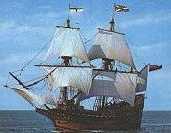Fortune passengers
The ship Fortune arrived at Plymouth on November 9, 1621, just a few weeks after the First Thanksgiving. The Anne & Little James parted company at sea; the Anne arrived the latter part of June 1623, and the Little James some week or ten days later.
Occupation: Blacksmith.
Marriage: By 1623 (and probably by 1621) Elizabeth _____, probably also a passenger on the Fortune in 1621; she appears in no record after 1627, and may have died soon after the birth of the last child about 1634, or she may have lived until just before William Bassett married his second wife.
Military: 1637. Volunteered for the Pequot War.
He did not complete the initial trip to the New World with the other Pilgrims on board the Mayflower, as the ship he was traveling on, the Speedwell, developed leaks and had to return to England.
Cushman sailed to Plymouth, Massachusetts in the fall of 1621 aboard the Fortune, but returned shortly thereafter to England to promote the colony's interests. There, he published an essay concerning the Lawfulness of Plantations, which was appended to Mourt's Relation. This document is of interest to modern scholars because of its treatment of the economic reasons for emigration.
Unfortunately, before he could return to the New World, he succumbed to an outbreak of plague in London, in the spring of 1625; as a result, the site of his grave is unknown.
His son, Thomas Cushman (ca. 1607/08-1691), who accompanied him on the Fortune, was raised in the family of Plymouth Colony Governor William Bradford (1590-1657), and served as Ruling Elder of the Plymouth church from 1649, until his death in 1691. ... Thomas married Mary Allerton who died in 1699. She was the last survivor of the original Mayflower passengers.
He was distinguished for his religious zeal, and opposed those that he believed to be heretics, particularly the Quakers. He became infamous for the banishment of those who would not conform to his specific church law, including Samuel Gorton, the first governor of Rhode Island. He restructured the local government to secure his position and lead the persecution of numerous people for offenses such as smiling in church, harboring non-church members, and tending garden during the Sabbath. He also procured revenue for the colony's grammar schools so future generations would be better educated.
Governor Prence gave to Wamsutta and Pometacom, the sons of Massasoit, the names Alexander and Philip as a compliment to their warlike character.
Prence married three times. His first wife was Patience Brewster, a passenger on the Anne.
The Anne and the Little James left London, England with her Master, William Peirce, and arrived in Plymouth June or July of 1623, carrying many family members left behind from the Mayflower and the Fortune.
Robert’s name appears in the earliest list of freemen, dated 1633. His public service was limited to serving on juries and as surveyor of the highways. His legal dealings mostly centered on land transactions although, in 1660 he was summoned to court to "answare for speakeing contemptuously of the ordinance of singing of psalmes."
He was designated a cooper in later records.
We postulate that Francis Sprague had two wives, the first of whom died in England before 1623, and the second of whom he married in New England about 1630.
On 2 August 1642 Francis Sprague, innholder, of Duxborrow, was accused of selling a fowling piece to an Indian [PCR 2:43].
Elizabeth Warren, daughter
Richard Warren died in 1628. His wife Elizabeth outlived him by 45 years, dying at Plymouth in 1673. Her death was noted in the Records of Plymouth Colony (PCR 8:35): "Mistris Elizabeth Warren, an aged widdow, aged above 90 yeares, deceased on the second of October, 1673, whoe, haveing lived a godly life, came to her grave as a shocke of corn fully ripe."
During the long period of her widowhood, Elizabeth Warren’s name appears in the records of Plymouth Colony. She appears first as executor of her husband’s estate, next paying taxes owed by a head of household, and finally as an independent agent in her own right.
Mary Warren married Robert Bartlett of the Mayflower. Elizabeth Warren the daughter married Richard Church.
Most or all of the Mayflower passengers have societies dedicated to remembering them and recognizing their descendants. Some Fortune and Anne passengers have societies too, but others are only footnotes in history.
Many Fortune and Anne passengers were part of the same groups that came over on the Mayflower. They were delayed for some reason, or the husbands came first and the wives and children came later.
Probably none realized history would immortalize them as the "founders" of America. If they'd known, they might've tried harder to come on the Mayflower rather than the Fortune or Anne.
Moral of the story: If you're doing something with historical ramifications, try to be the first. Few remember the people who came second.
For more on the subject, see Tallying My Pilgrim Ancestors and My Mayflower Ancestors. For more on the subject in general, see Ten Little Pilgrims and Indians.


No comments:
Post a Comment